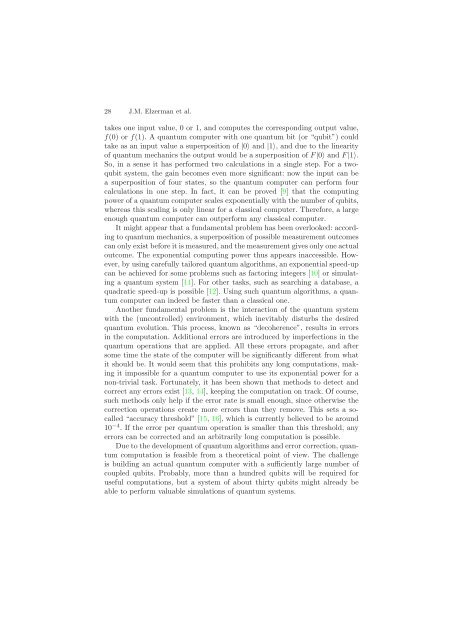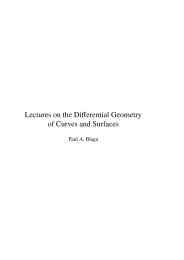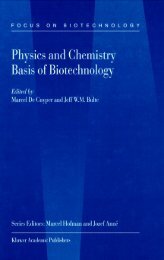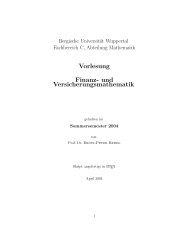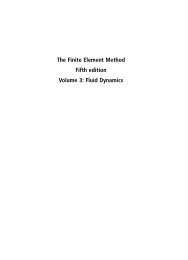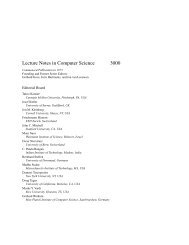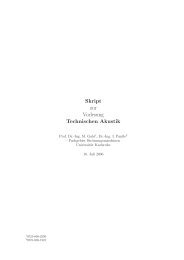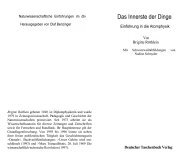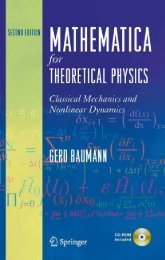Heiss W.D. (ed.) Quantum dots.. a doorway to - tiera.ru
Heiss W.D. (ed.) Quantum dots.. a doorway to - tiera.ru
Heiss W.D. (ed.) Quantum dots.. a doorway to - tiera.ru
You also want an ePaper? Increase the reach of your titles
YUMPU automatically turns print PDFs into web optimized ePapers that Google loves.
28 J.M. Elzerman et al.<br />
takes one input value, 0 or 1, and computes the corresponding output value,<br />
f(0) or f(1). A quantum computer with one quantum bit (or “qubit”) could<br />
take as an input value a superposition of |0〉 and |1〉, and due <strong>to</strong> the linearity<br />
of quantum mechanics the output would be a superposition of F |0〉 and F |1〉.<br />
So, in a sense it has perform<strong>ed</strong> two calculations in a single step. For a twoqubit<br />
system, the gain becomes even more significant: now the input can be<br />
a superposition of four states, so the quantum computer can perform four<br />
calculations in one step. In fact, it can be prov<strong>ed</strong> [9] that the computing<br />
power of a quantum computer scales exponentially with the number of qubits,<br />
whereas this scaling is only linear for a classical computer. Therefore, a large<br />
enough quantum computer can outperform any classical computer.<br />
It might appear that a fundamental problem has been overlook<strong>ed</strong>: according<br />
<strong>to</strong> quantum mechanics, a superposition of possible measurement outcomes<br />
can only exist before it is measur<strong>ed</strong>, and the measurement gives only one actual<br />
outcome. The exponential computing power thus appears inaccessible. However,<br />
by using carefully tailor<strong>ed</strong> quantum algorithms, an exponential spe<strong>ed</strong>-up<br />
can be achiev<strong>ed</strong> for some problems such as fac<strong>to</strong>ring integers [10] or simulating<br />
a quantum system [11]. For other tasks, such as searching a database, a<br />
quadratic spe<strong>ed</strong>-up is possible [12]. Using such quantum algorithms, a quantum<br />
computer can inde<strong>ed</strong> be faster than a classical one.<br />
Another fundamental problem is the interaction of the quantum system<br />
with the (uncontroll<strong>ed</strong>) environment, which inevitably disturbs the desir<strong>ed</strong><br />
quantum evolution. This process, known as “decoherence”, results in errors<br />
in the computation. Additional errors are introduc<strong>ed</strong> by imperfections in the<br />
quantum operations that are appli<strong>ed</strong>. All these errors propagate, and after<br />
some time the state of the computer will be significantly different from what<br />
it should be. It would seem that this prohibits any long computations, making<br />
it impossible for a quantum computer <strong>to</strong> use its exponential power for a<br />
non-trivial task. Fortunately, it has been shown that methods <strong>to</strong> detect and<br />
correct any errors exist [13, 14], keeping the computation on track. Of course,<br />
such methods only help if the error rate is small enough, since otherwise the<br />
correction operations create more errors than they remove. This sets a socall<strong>ed</strong><br />
“accuracy threshold” [15, 16], which is currently believ<strong>ed</strong> <strong>to</strong> be around<br />
10 −4 . If the error per quantum operation is smaller than this threshold, any<br />
errors can be correct<strong>ed</strong> and an arbitrarily long computation is possible.<br />
Due <strong>to</strong> the development of quantum algorithms and error correction, quantum<br />
computation is feasible from a theoretical point of view. The challenge<br />
is building an actual quantum computer with a sufficiently large number of<br />
coupl<strong>ed</strong> qubits. Probably, more than a hundr<strong>ed</strong> qubits will be requir<strong>ed</strong> for<br />
useful computations, but a system of about thirty qubits might already be<br />
able <strong>to</strong> perform valuable simulations of quantum systems.


